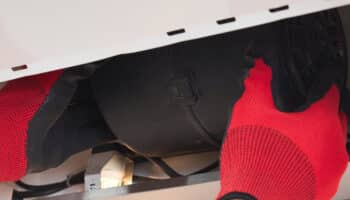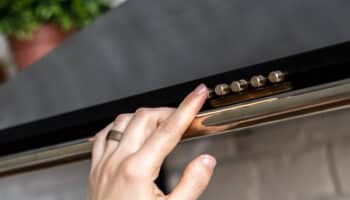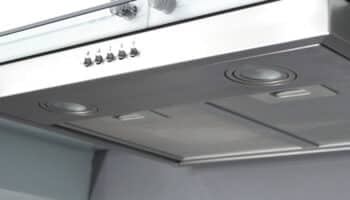Have you tried it all to stop your range hood from turning on or off out of nowhere? Before you give up and go buy a new one, check out these simple possible causes and solutions.
Is your house haunted? Who knows? But I’m almost 100% positive that if it is, Casper has got more important stuff to do than mess with your range hood. These devices are sometimes overly sensitive to their environment and other conditions within your home.
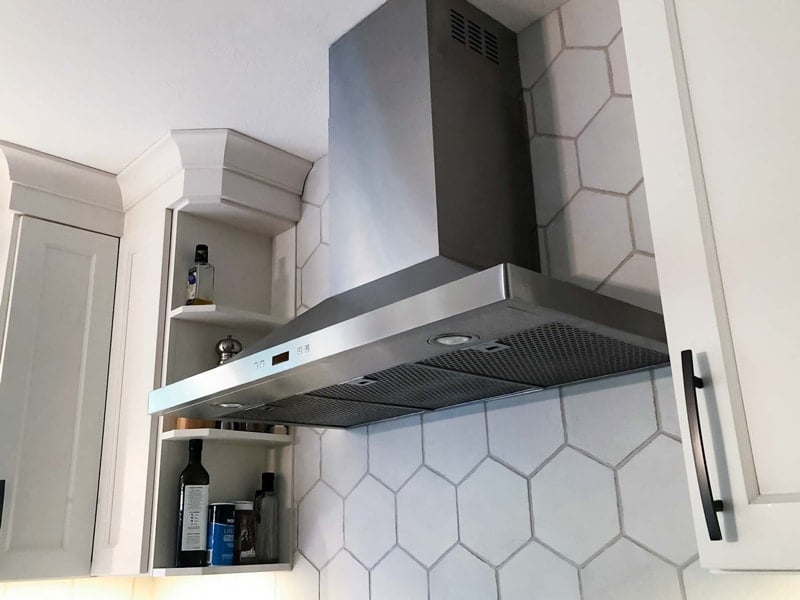
It’s quite likely that one of the situations listed below are to blame for the mysterious activation or deactivation of your kitchen appliance.
So, without further ado, let’s dig in!
Your Range Hood Could Be Turning Itself On or Off Because…
- There’s an error in communication between the primary circuits
- There’s a problem with your remote control
- The temperature on your cook top is too high when not in use
- There’s too much moisture in your home
As crazy as it sounds, sometimes the most sophisticated range hoods are the ones that cause the most problems. These appliances are configured and equipped to react to the slightest change in the environment.
This is not necessarily a bad thing. After all, I’d rather have a range hood that powers up even when I don’t need it to, than a faulty one that fails when I’m in trouble!
#1 There’s an Error in Communication Between the Primary Circuits
The inner circuits of your range hood could be acting up
I once heard a technician say that 99% of all electronic device-related problems could be solved by simply restarting them. Sometimes, something as obvious as disconnecting and reconnecting your range hood could do the trick.
Every now and again, your appliance’s primary circuit could be having trouble communicating with the rest of the circuit board, causing your range hood to turn on or off randomly.
This is quite rare, but a possibility nonetheless.
Solution: The procedure is swift and very similar to that of restarting an Internet modem. First, unplug the range hood from the socket, then wait for 30 seconds before plugging it back in.
This might seem like an obvious fix, but you’d be surprised at how many times this has ended the autonomous activation-deactivation issue.
#2 There’s a Problem With Your Remote Control
Check your remote controller’s batteries when in doubt
Remember a while back, when we were talking about sophisticated range hoods? Well, some of them even come with remote controllers now! If you happen to be one of the lucky owners of these sci-fi-like appliances, you’re going to want to try this solution.
More often than not, a faulty remote can be the result of dead batteries, bad circuitry, or even interference with other signals.
That’s right, even your Wi-Fi signal could be causing your remote to fail and send “on-off” commands to your range hood.
Solution: If you’ve tried the previous step with no success, try replacing the batteries on your remote. If that doesn’t work, you can either look for a replacement, or check any nearby signal emissions that could be causing problems.
If you want to get any replacement part – or see how much one would cost – click to enter your model number in the search bar below. Our partners at AppliancePartsPros stock almost every part with free guides on how to install them.

#3 The Temperature on Your Cook Top Is Too High When Not in Use
Did you forget to turn the stove off after you finished cooking? Is there a fire in your kitchen? These are all the questions your range hood will ask itself before determining it’s time to turn its exhaust fans on to cool down the room.
Several models have temperature sensors built into them to detect when the cook top is too hot. Some kitchen layouts (especially those with a lot of windows) are more prone to having high temperatures during the day.
If your cook top is constantly under direct sunlight, your range hood might mistake this as cooking temperatures and turn itself on for no apparent reason.
Solution: Try to have something like a damp cloth to cover your cook top while you’re not using it to prevent heat buildup during the day. This should stop it from wrongly activating its exhaust fans.
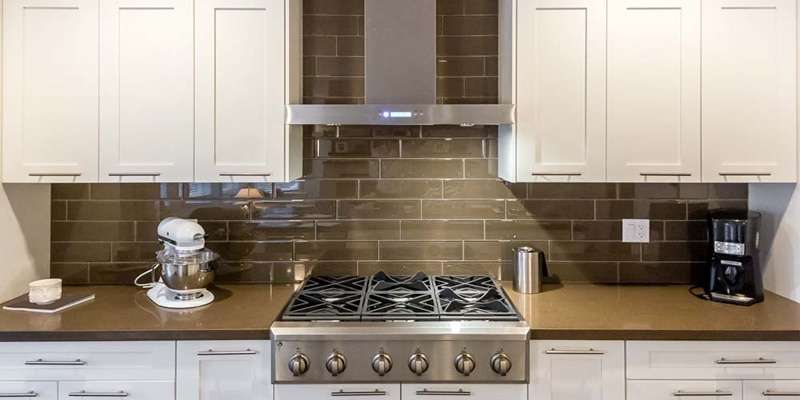
#4 There’s Too Much Moisture in Your Home
Remember to check your home for excess ambient moisture
Your range hood can do a lot for you.
It can keep your house smoke-free, remove a lot of harmful particles that fly into the air while cooking, and sometimes, even recirculate the air to prevent moisture formation.
I wouldn’t be surprised if it helped you report your taxes in the near future.
While this all sounds wonderful, sometimes these handy functions can backfire and become a nuisance.
If your home is prone to moisture and condensation, your range hood might self-activate in an attempt to counteract this. Range hoods are normally equipped with little sensors called “humidistats”.
As their name suggests, they are programmed to detect higher-than-normal levels of moisture in a specific area. This component could be your culprit.
Solution: While checking or fixing your range hood’s humidistat might be a job for your trusted technician, there are other actions you can take to reduce the moisture in your home.
Most hardware stores sell moisture-absorbing pellets that you can place nearly anywhere within your living space. This should resolve the problem, and as a bonus, prevent all other humidity-related issues you might experience in the future.
Bonus
While I’m all for encouraging you to try and fix your own appliance issues, there’s a point where it’s best to leave the job to more experienced, professional technicians.
Below, you’ll find a couple more possible reasons why your range hood could be turning on or off on its own.
#5 Replace your temperature sensor
No one likes having a faulty kitchen appliance, but sadly, it’s something unavoidable, like rush hour traffic or distant family gatherings. If your range hood’s temperature sensors are failing, you’re going to have to call a technician you trust to have them replaced.
When these sensors fail, your range hood is constantly getting signals that the temperature in your kitchen is too hot, and thus it must activate itself to prevent heat buildup.
Solution: Call a professional, check your warranty status, lay back, and let them work. Your haunted house will become a regular living space in no time.
#6 Circuit malfunction
When you’ve exhausted all options, it might be time to accept that the problem is more technical than situational. If this is the case, the circuit that makes your range hood operational might be failing as a whole, and there’s a possibility that it could need replacing.
I’d encourage you to try all the aforementioned solutions before determining this to be the source of the issue.
Conclusion
Range hoods these days are sophisticated machines that make our day to day cooking easier.
They ensure that our homes remain clean, dry, and free of harmful particles released when we prepare our meals. That being said, sometimes certain environmental conditions can make them become a nuisance and disturb our peace.
There’s a wide variety of quick and easy solutions you can put in place on your own to prevent such events from happening.
Don’t get discouraged if you try one of them and fail. Just move on to the next one!
However, if your range hood keeps turning on and off on its own even after exhausting this list, do not hesitate to get the help of a professional. It’s great to try and be self-sufficient, but always safely.
If you found this article helpful, I encourage you to keep reading below. There’s many more useful pieces that can help fix any other problem you might be having.
Check them out, and thank you for reading. Happy DIY’s!





